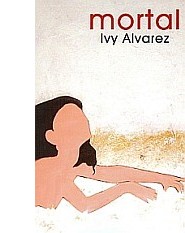

Ivy Alvarez's Mortal
Alvarez, Ivy. Mortal. Red Morning Press, 2007. (63 pages). ISBN 978-0-9764439-2-6
In Mortal, an incredible first collection, Ivy Alvarez accentuates the stitches of mortality through well-crafted lyric and prose poems. Weaving mythology and personal experience, she poignantly captures the pain and joys of mothering:
they had to unzip me
to let the cat
out the bag
blood bathed my belly
thighs
and baby Seph
I stopped counting stitches
forgave the marring
of my clean envelope […] (1)
Alvarez’s casual tone, visceral imagery, and surprising figurative language keeps the reader engaged throughout. We read the “clean envelope” not only as the speaker’s body, but also as memory and the white page itself. The “marring” becomes the site of poetry—each line a stitch on the page.
Throughout Mortal, Alvarez revisions the classic mother-daughter myth of Demeter and Persephone, but “this time it is Demeter Hades wants” (3). This inversion creates a powerful re-imagining of loss:
Persephone presses her ear to the earth.
There is no sound, but for grains shifting
to accommodate her ear […] Persephone
dreams of her fist pushed in that earthy mouth,
of hauling Demeter out—safe, rescued. (5)
Although it’s easy enough to invert a myth and imagine the consequences, Alvarez complicates the myth by recasting Persephone and Demeter as a modern-day “Seph” and “Dee”:
Dee’s photo in Seph’s pocket
mimics her smile. She leaves her
kisses and salt for the three
years away. Seph stands, accepts,
then says, You’ll have to learn
to be my mother again […]
They board the plane. Air pockets
press in Seph’s ear. Dee finds her
jellybeans, tells her to chew. (27)
Alvarez nurtures the theme of mothering by capturing these small moments of tenderness. In the poem “a memory of corn”, Dee and Seph picnic by a reservoir:
[…] Mother
and daughter take a corncob each; shuck off
its clothes and yellow filaments. The corns’
niblets darken in the heat. Retrieved, salted,
cooling, they lie on plates. Seph nibbles on
the neat rows, methodical as a typewriter.
Ping! With a fingernail, Dee picks out fibres
caught between her teeth. (2)
Alvarez resists the poetic tendency to simply name-drop mythic characters in the hopes of giving a banal poetic moment mythic quality. Instead, Alvarez gives the mythic characters personality and depth, setting them in modern-day situations. In a sense, Alvarez allows us to imagine Demeter and Persephone as truly mortal.
Besides Dee and Seph, this collection is haunted by other figures (a “you” and “I”, a “she”, and an unnamed “mother” and “daughter”) haunted by loss:
when she wakes there’s a scar
where a breast used to be
she shows it to me
excoriated and raw
[…]
when we cross the street
she holds onto my hand
as if I was ten again
and things were still to happen (45)
There’s a deep sadness throughout this collection: a daughter’s sorrow at the thought of losing her mother and a mother’s fear of losing her daughter. In this elemental tragedy, mythology becomes mortal and mortality becomes mythic pain:
I could collect
basketfuls of my hair
knit a little rug
from what I’ve shed
you could weave a carpet
lay down whole rooms
a house
down the street
and out into the highway
with yours
a full twenty years on me
plus the chemotherapy
you’ve got a head start
the miles you could’ve covered
with your hair (52)
With every poem in this collection, we become more acutely aware that mothers—despite their often mythic presence—are mortal. Alvarez manages to express this at the edge of sentimentality, a place where emotion is crafted through lyric and narrative tenderness:
I show my mother a book of breasts. At first, she’s
shocked and pulls away. But then, she returns to
them and looks at the pictures on the cover. She
points to one […] ‘I like these ones,’ she says. ‘They are elegant.’ (49)
Alvarez stunningly balances life’s precious moments with the equally precious moments of mortality’s absences. The end of each poem, as well as the end of the book, intimates how even though “light / drains the room / into bonelessness” (57), we must continue to notice the elegance of being alive. Mortal is a deeply emotional collection that teaches us how “we grow into our scars” (8).
Craig Santos Perez's reviews have appeared, or are forthcoming, in Pleiades, The Denver Quarterly, First Intensity, Rain Taxi, Jacket, and Rattle, among others. He blogs at blindelephant.blogspot.com.
Boxcar Poetry Review - ISSN 1931-1761